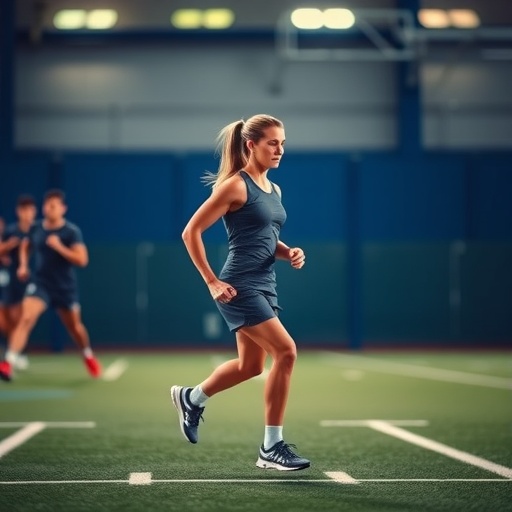A groundbreaking study conducted by Edith Cowan University (ECU) reveals a paradox within the realm of recreational athletes: despite a majority perceiving themselves as both healthy and physically fit, there exists a stark dissatisfaction with their own body image. This disconnect highlights a critical mental health issue intertwined with physical activity, underscoring the complex relationship between exercise, dietary habits, and psychological well-being in non-elite athletes.
The survey involving recreational athletes found that 69 percent considered themselves healthy, and 62 percent believed they were fit, yet a mere 26 percent expressed satisfaction with their body weight and shape. These figures spotlight a disturbing trend where physical health perceptions do not align with body satisfaction – a divergence that may fuel harmful psychological and behavioral patterns. This finding suggests that identity related to health and fitness is multifaceted and not solely dependent on objective physical parameters.
Dr. Valeria Varea from ECU explains that athletes, including recreational exercisers who engage in structured physical activities, are disproportionately vulnerable to developing disordered eating and maladaptive exercise behaviors. The data corroborate previous research indicating that athletic individuals, especially those involved in sports emphasizing leanness or weight categories, are statistically at increased risk compared to their non-athlete counterparts. This observation is critical as it extends concerns beyond elite sports, highlighting everyday athletes’ mental health challenges.
Further complicating the issue, 67 percent of these recreational athletes reported experiencing anxiety or emotional distress when deprived of access to foods they consider healthy. Additionally, an overwhelming 88 percent confessed to feeling guilt following consumption of foods they deemed unhealthy. Such psychological responses align with emerging descriptions of Orthorexia Nervosa (ON), a pathological obsession with consuming only “righteous” or pure foods. This fixation transcends typical healthy eating, leading to heightened anxiety and feelings of loss of control when dietary routines are disrupted.
ON differs fundamentally from other eating disorders like anorexia nervosa by focusing on food quality rather than quantity. In contrast to caloric restriction, individuals with ON prioritize the purity and nutritional value of their intake, which paradoxically can result in significant nutritional deficiencies and psychological distress. This nuance complicates both diagnosis and intervention, as traditional eating disorder frameworks may overlook such quality-centric fixations.
Moreover, certain athletes may be susceptible to Orthorexia Athletica (OA), an emerging concept characterized by an obsessive intertwining of strict, health-focused eating and compulsive exercise. This condition manifests as a crossover from disciplined lifestyle habits to pathological behaviors where exercise and dietary control dominate daily life, impairing both mental and physical health. The dual concern with dietary quality and exercise compulsion distinguishes OA from ON and constitutes a unique challenge for health professionals.
Professor Dawn Penney, Vice Chancellor’s Professorial Research Fellow at ECU, elaborates on these conditions, noting that OA uniquely involves a compulsive drive for excessive exercise coupled with rigid nutrition regimes, often fueled by sporting cultures that endorse “slim to win” mentalities. Such environments cultivate unhealthy ideals, pressuring athletes toward extreme measures for maintaining or achieving desired body aesthetics, often at great personal cost.
One of the most troubling aspects highlighted by both Dr. Varea and Professor Penney is the absence of formal medical recognition or diagnostic criteria for ON and OA. Without clear clinical definitions, athletes and healthcare providers face difficulty identifying when normal fitness behaviors tip into unhealthy fixation, leaving many without appropriate support or intervention pathways. This diagnostic ambiguity presents a critical barrier to addressing these disorders at both grassroots and professional levels.
To address the complexity of these conditions, ECU researchers advocate for educational strategies tailored to the diverse ways individuals engage with sport, particularly those outside formal club affiliations or professional domains. As the landscape of physical activity evolves—with more individuals partaking in self-managed exercising and decentralized sporting communities—the need for nuanced, accessible mental health guidance is paramount to mitigating eating and exercise disorders.
Further research is needed to refine educational frameworks capable of effectively communicating risks and healthy practices to a broad spectrum of athletes. Understanding how information dissemination impacts health behavior across varied demographics will be essential in developing prevention techniques that account for the psychological intricacies of athletic body image and nutrition.
The study notably emphasizes that everyday athletes, who constitute a large portion of physical activity participants, represent a vulnerable segment regarding mental health and eating behaviors. Tackling these issues requires a multidisciplinary approach blending sports science, psychology, nutrition, and public health to foster sustainable, balanced patterns of health and fitness without compromising mental well-being.
This research is a clarion call to the sporting and medical communities alike—recognizing and addressing the psychological landscapes of health-conscious athletes is crucial. The findings not only challenge simplistic notions of health being synonymous with fitness but also illuminate the pressing need for comprehensive support systems that acknowledge the fine line between discipline and disorder.
In summary, the ECU study contributes vital insights into the paradoxical state where recreational athletes may be outwardly fit yet internally struggling with body dissatisfaction and disordered eating patterns. More importantly, it underscores the critical necessity for targeted education, broader awareness, and clinical recognition of orthorexia-related conditions within athletic populations, setting the stage for future interventions designed to promote holistic health.
Subject of Research: People
Article Title: Sport participation and the pursuit of active and healthy lifestyles: everyday athletes’ relationships with eating and exercise Open Access
News Publication Date: 8-Sep-2025
Web References: DOI: 10.1108/HE-09-2024-0108
Keywords: Physical exercise, Psychosomatic disorders




